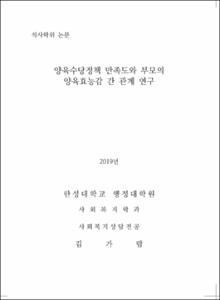양육수당정책 만족도와 부모의 양육효능감 간 관계 연구
= A Study on the Relationship between Satisfaction with Home Childcare Allowance and Parenting Efficacy
- Files in This Item:
-
-
Download
 200000218207.pdf
기타 데이터 / 746 kB / Adobe PDF
200000218207.pdf
기타 데이터 / 746 kB / Adobe PDF
-
Items in Repository are protected by copyright, with all rights reserved, unless otherwise indicated.